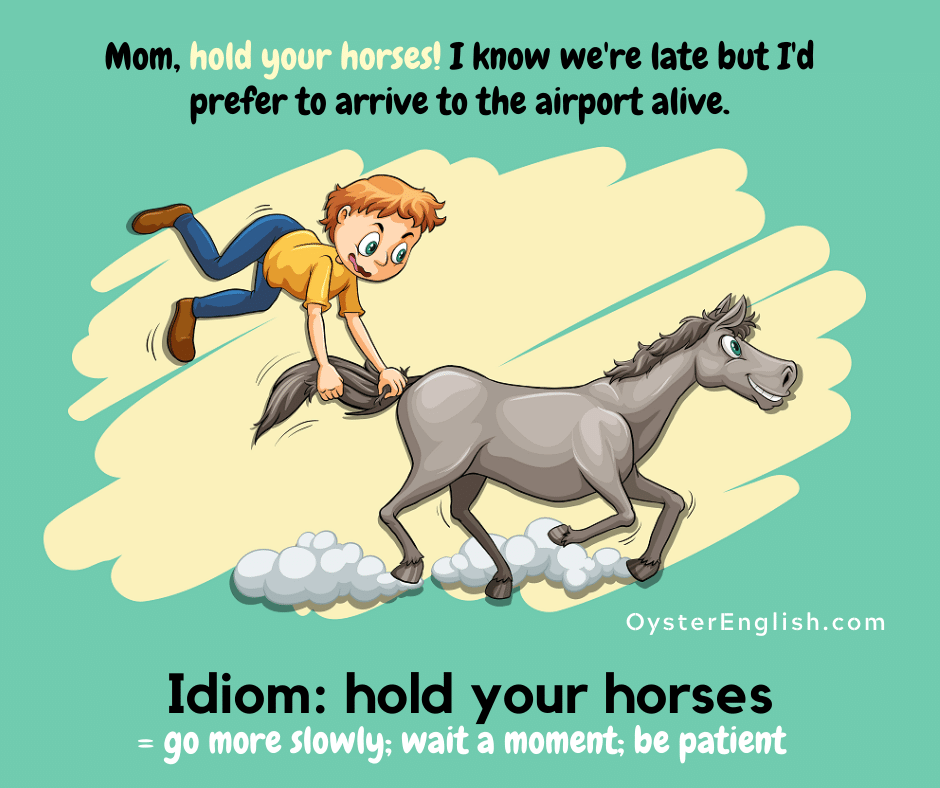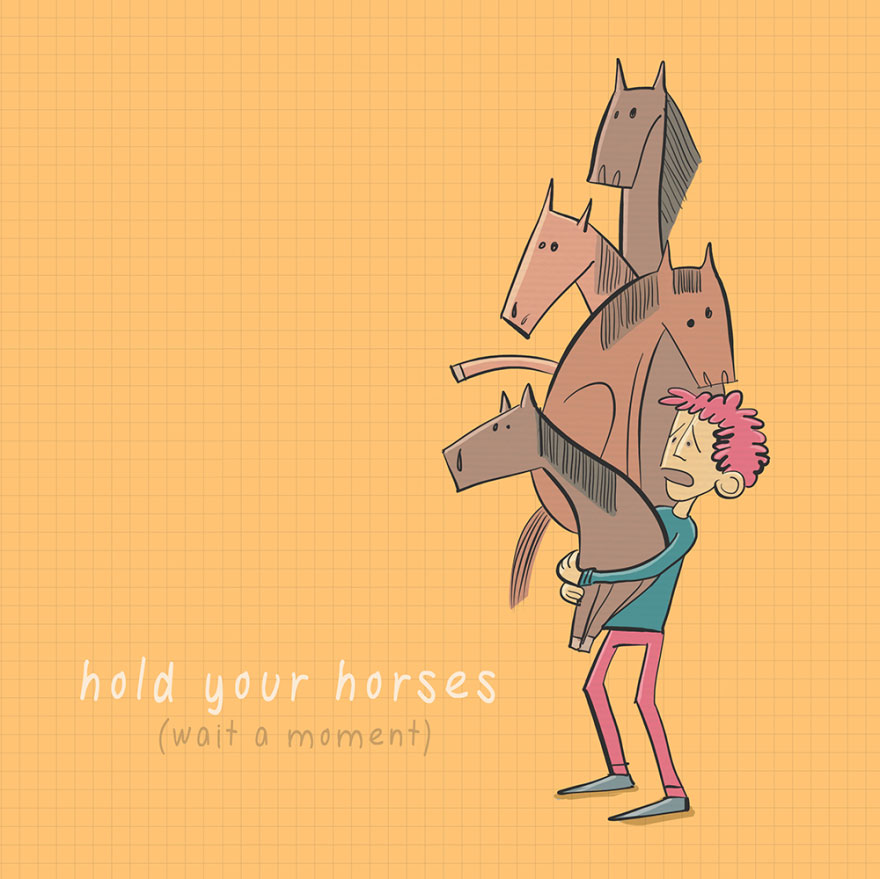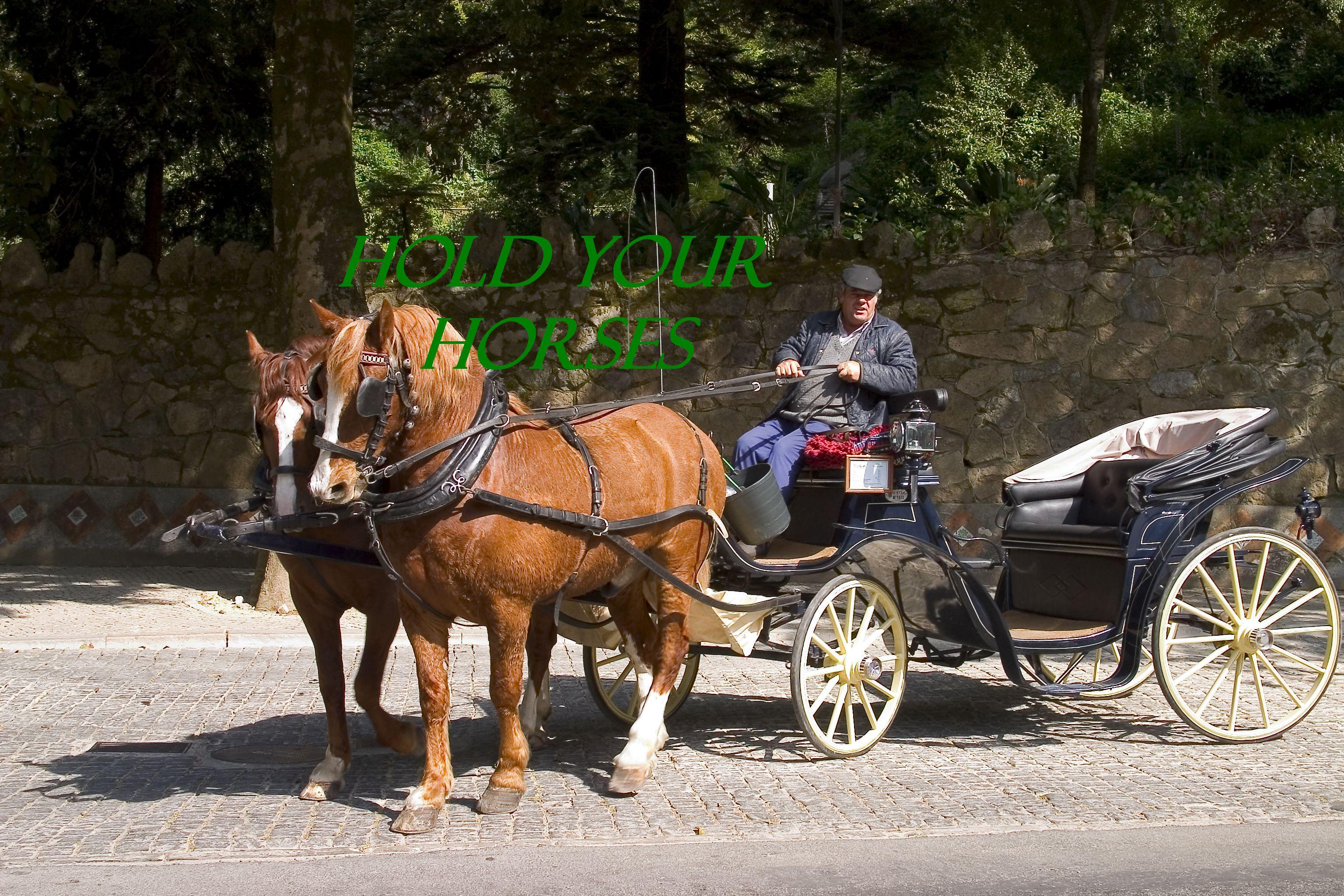
' hold your horses ' IDIOM OF THE DAY Idioms, English vocabulary words, English lessons for kids
Another common horse idiom is "Hold your horses", also used as "Hold the horses". It means wait, hang on, don't go ahead just yet. It often refers to situations when someone is about to make a rash decision or do something irresponsible. BlueRingMedia / Shutterstock.com This horse idiom likely originates from 800 BC.

Idiom Hold your horses (meaning & examples)
Hold your horses - Idioms by The Free Dictionary Definition of hold your horses in the Idioms Dictionary. hold your horses phrase. What does hold your horses expression mean? Definitions by the largest Idiom Dictionary. Hold your horses - Idioms by The Free Dictionary https://idioms.thefreedictionary.com/hold+your+horses Printer Friendly

10 Most Common English Idioms And Their Meanings Explained in Very Funny Way
Even though it means "stop your horses" in the Erie-canal context, it was a standard instruction along the Erie's tow-paths, which cemented its place in our language. Detractors of this theory claim that the full expression is "hold your horses there, cowboy," meaning its origins stem from cattle herding rather than canal transportation.

Hold Your Horses Idioms Online
used to tell someone to stop and consider carefully their decision or opinion about something: Just hold your horses, Bill! Let's think about this for a moment. SMART Vocabulary: related words and phrases Linguistics: expressions telling people to stop doing something age break it up! idiom butt out cool cool it idiom grow grow up hold

"Hold your horses" means "slow down, wait". Example Hold your horses! Grab an umbrella before
hold your horses Meaning to wait to be patient to hold on used for telling someone who is getting ahead of themselves to stop and consider their action or decision Example Sentences Hold your horses! We have not won yet, so don't start celebrating. Hold your horses, will you! Let's have a discussion on this first before we jump to conclusions.

5 Engelse uitdrukkingen waarmee je meteen klinkt als een moedertaalspreker! ESL Taalreizen
Idiom: Hold your horses Meaning: If someone tells you to hold your horses, you are doing something too fast and they would like you to slow down. Country: International English | Subject Area: Animals | Usage Type: Both or All Words Used Contributor: Richard Flynn

Idiom Hold Your Horses Funky English
"Hold your horses" is a common idiomatic expression in both written and spoken English. As our AI suggests, it is generally used to tell someone to be more patient or to slow down. Looking at the reliable examples provided by Ludwig, we can see how this idiom is often used in newspaper articles about the launch of a new high-tech marvel.

Idiom "hold your horses" idioms phrases expressions followme likeforlike Visit ESLexpat
Meaning: When someone says hold your horses, it's a way of telling a person to wait, hold on, or stop. Example: I'm taking my daughter to the park soon. She's very excited and is trying to rush me out the door, so I had to tell her: " Hold your horses, I'm not ready yet." Synonyms / Similar Phrases: 1. Hold it 2. Hold the phone 3.

Hi there! 😊 Our idiom of the day is ”Hold your horses”, which means “slow down, wait.“ This
The idiom "hold your horses" is used to tell someone to be patient, calm down, or wait a moment. It is often used when someone is getting too excited, eager, or impulsive about something and needs to take a moment to think or wait for further information or instructions. The phrase implies the need to slow down and not rush into a decision.

Idiom of the day Hold your horses. Meaning Slow down, wait. idiom idioms english
"Hold your horses" literally means to keep your horse (s) still, not to be confused with holding them in a stable. Someone is to slow down when going too fast, [1] or to wait a moment, or to be more careful, [2] or to be patient before acting. It is usually followed up with an explanation to demonstrate why you should wait. [3]

Hold Your Horses Meaning Idiom Hold your horses (meaning & examples) In the past, many
Wait a moment or be patient (often because you are moving too quickly or thoughtlessly). Whoa, hold your horses, kids. We're going to sing before we start eating cake. I know you're excited to see the prototype, but you all just need to hold your horses while we get set up. See also: hold, horse

hold your horses Funny posters, Cute puns, Funny puns
The idiom "hold your horses" is one we use in English when we want to tell someone to be patient, wait, or just slow down. It's often used when someone is acting crazy or super hyper or just going too fast for your liking, and you want them to show a little restraint. Origin or Etymology of Hold Your Horses

Hold Your Horses Meaning Idiom Hold your horses (meaning & examples) In the past, many
Hold Your Horses. The meaning of 'Hold Your Horses' is to be patient, wait. It can be used when someone is asking you, or putting pressure on you, to do something. Example of use: "Hold your horses sir, can't you see that we haven't finished here?!?!"

What Does Hold Your Horses Mean as an Idiom
What Does "Hold Your Horses" Mean? In short, "hold your horses" means to slow down, wait, or be patient. If someone tells you to hold your horses, they're asking you to stop and think about what you're doing. This idiom originates from horseback riding and horse-drawn carriages.

English Idioms Hold your horses YouTube
It isn't until much later, in Chatelaine, 1939, we get the more familiar phrase: "Hold your horses, dear." In 1943 there's a more descriptive use, in Hunt and Pringle's Service Slang: "Hold your horses, hold the job until further orders. (comes from the Artillery)" See other phrases that were coined in the USA.

IDIOM HOLD YOUR HORSES English Course Malta
The meaning of "hold your horses". " Hold your horses ". Meaning: Be patient. Example: I know you want to get off home but hold your horses, there's another ten minutes before the school bell is due. Where did it originate?: